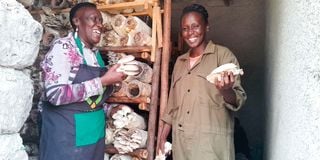Premium
Kiserian mushroom farmer out to scale new heights

Verah Mburugu (right) with her mother at her farm in Kiserian, Kajiado County.
What you need to know:
- Mushroom requires little water to grow and mature.
- Mushrooms become very long if they lack light.
Mushroom production is profitable yet the venture is largely neglected in Kenya.
Even so, Verah Nkirote Mburugu – a resident of Rimpa in Kiserian, Kajiado County – took the gamble of resigning as a marketer at a large company in Uganda four years ago to start growing mushrooms.
While still a marketer, she joined hands with three friends to start yoghurt business but suffered immense losses.
“We sold the yoghurt but there was nothing our books of accounts showed,” Ms Mburugu says.
Then out of nowhere, a friend advised her to try farming mushrooms.
“I used my marketing and sales skills in this new field. For young people interested in business, I encourage them to start as brokers.
This will make them understand where to source and sell the commodities,” she says.
“My friend said mushroom farming was profitable. I really needed money. I got a small plot for mushroom production in Kiserian,” Ms Mburugu says.
Producing mushrooms
She quit her job in 2019 and went fully into mushroom production. Unfortunately, the coronavirus pandemic struck the following year, hitting the business hard.
The government came to Ms Mburugu’s rescue with a Sh900,000 grant.
“I got a message on how the money would be wired to my bank account. I received the money a week later and immediately revived the project,” she says.
She built a structure for producing mushrooms. Growing mushrooms in the structure prevents their destruction by sunlight and heat.

Some of Verah Mburugu's mushrooms that are ready for harvest at her farm in Kiserian, Kajiado County.
“Mushroom will only grow in an environment that has fungi. We put the fungi on cotton or maize husks. We then clean the material used in growing the mushrooms,” Ms Mburugu adds.
The waste used to induce the fungi is steamed to remove impurities.
“Seven drums are used to steam the husks for about six hours. We engage the help of seven workers who have different roles to play.
The water is placed at the bottom of the drums and the husks in the middle,” she says.
Greatest challenge
The farmer then takes the clean husks and places them in plastic bags. Here, the mushroom spores spread quickly.
“The spores are in plenty two to three weeks later. With the fungi spreading, we place the bags on shelves to monitor the mushroom growth,” the farmer says.
“When the fungi have spread as required, we start sprinkling a small amount of water on the bags.”
Mushroom requires little water to grow and mature. The rate of growth varies with type.
The farmer says many clients do not like large mushrooms.
“Mushrooms do well when grown in a room. I will fail if I allow air to flow freely,” the 35-year-old says.
The greatest challenge to mushroom farming is destruction by snails.
“To deal with the problem, we literally search for the animals,” she says.
Markets abroad
For successful production, the air needs to be clean, there should be light and the temperature should be five t 16 degrees Celsius.
Mushrooms become very long if they lack light.
“I wish more Kenyans could eat mushrooms. I’d not be struggling to look for markets abroad if that were the case,” she says.
“I sell a kilo of mushrooms for Sh400. If you have Sh100, you get a quarter of that.”
Ms Mburugu urges young people to start growing mushrooms and not wait for office jobs as these may never come.
The farmer sells at least 15 kilogrammes of mushrooms daily. She also sells cotton husks and mushroom seeds.
“I have given my mother the responsibility of distributing the mushrooms to shops in Nairobi. My workers begin packing the mushrooms around 4pm daily,” she says.
“I have discovered that dried mushrooms have a shelf-life of up to two years.”





